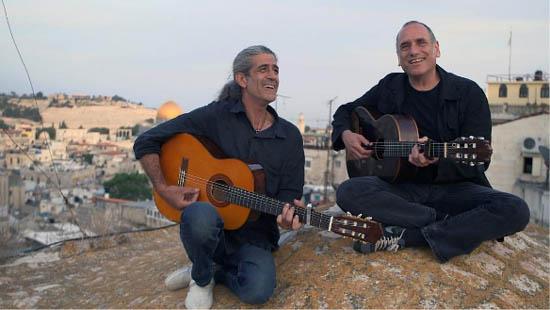|
Film review: East Jerusalem/West Jerusalem
|
|

East Jerusalem/West Jerusalem
That spirit of understanding and cooperation is the foundation for the film, which chronicles Broza and a like-minded crew of singers and players making the 2014 album also titled East Jerusalem/West Jerusalem (Broza Records). American musician and activist Steve Earle is brought in to produce, and his asides reveal moments both humorous (his reluctance to use the word “bouzouki” while going through customs) and telling (the fact that, as a recovered addict, he doesn't believe in lost causes). Much of the action takes place in the studio of the Palestinian band Sabreen, which is not a glossy or glamorous place. Similarly, the music doesn't have or need much in the way of fancy trappings. It's primarily acoustic, even the accompaniment for articulate Palestinian hip hop artist Muhammad Mughrabi. Broza's crew lays down guitar, bass and drums groundwork, leaving space for further zest provided by qanun, oud, darbuka and yes, Earle's unspoken bouzouki. Another Palestinian guest, singer Mira Awad, brings a wisdom and a voice equal in their beauty, and Earle's song from a decade previous, “Jerusalem,” gets a new take. As all this unfolds, it becomes clear that the music, and how concisely it echoes the peace-seeking spoken sentiments of those involved, is what makes this documentary the sum of its parts. Directors Erez Miller and Henrique Cymerman don't go for anything unnecessarily surreal, atmospheric or dramatic. The music speaks and is allowed to speak in the studio, during Broza and Mughrabi's visit to a refugee camp school, as a mixed choir of young people chimes in on a version of “What's so Funny 'bout Peace, Love and Understanding,” in a nighttime feast scene, everywhere. It ends as it began, with Broza and Freij on the rooftop while the Jerusalem Day parade continues to spiral into us-versus-them ugliness below. The two men embrace, descend into the chaos and are as perplexed by the hatred as any truly civilized being should be. And though there's a brief epilogue with Broza once again reaching out via making music in the company of young children a year later, the film concludes neither prettily nor naively. There's hope here, but there's also reality. Still, even if it takes more than music to change that reality, music is not a bad place to start. - Tom Orr
© 2016 RootsWorld. No reproduction of any part of this page or its associated files is permitted without express written permission.
|
|
|
|